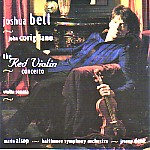I’ve heard several of my colleagues sneer at this release, as if a new concerto by a major composer, played by one of today’s finest soloists, constitutes pandering to commercial interests. Maybe it’s the film-music tie-in, or the fact that John Corigliano wrote the opening Chaconne as a separate piece (no big deal there; it worked for Schumann, as Corigliano points out himself in his booklet notes). Perhaps it’s yet another manifestation of the anti-social inferiority complex that so pervades classical music writing, combined with that noxious cocktail of musical ignorance and hype that passes for PR these days. Whatever the answer, the truth is that Corigliano’s “Red Violin” Concerto is a masterpiece that ought to become a repertory piece forthwith. After all, God knows we’re not overflowing with superb new modern violin concertos.
Corigliano has pointed out that the music’s origins as a film score forced him to write in a more traditional idiom than he might otherwise have done, and that’s all to the good. He deserves a mountain of credit for recognizing that a violin concerto in the grand tradition is a public work, designed to appeal to listeners prepared to be dazzled by virtuoso fireworks and beguiled by great tunes. Lyric sentiment is very much the point. This doesn’t mean that the composer needs to “write down” to the public. Neither Berg nor Shostakovich, to cite two famous examples, did so. He simply needs to create great music out of a certain type of thematic material. This is exactly what Corigliano has achieved, without compromising anything in the way of formal ingenuity or his trademark textural imagination.
The Red Violin Concerto has four movements: the opening Chaconne, a whispery “pianissimo scherzo”, a warmly romantic “andante flautando”, and an unbelievably dazzling “accelerando finale”. In places, such as the scherzo, where Corigliano relies less on conventional melody, he creates textures of unfailing aural appeal. There’s something wonderful in soft, gossamer, fast music as composers from Mendelssohn (A Midsummer Night’s Deam) to Lutoslawski (Concerto for Orchestra) have always understood, and here too Corigliano partakes of a well-established tradition that he makes wholly his own. There are typically “avant-garde” moments–purely textural coloristic devices and such–but they are always attractive and contribute to the ongoing musical discourse.
Corigliano’s solo writing is quite simply the last word in brilliance, exploiting every possibility of modern violin technique. It almost goes without saying that Joshua Bell plays like a person possessed, though it could be that either the otherwise excellent engineering or the circumstances of live performance (or both) rob his tone of some of its richness. Still, this is one hell of a performance, with the opening Chaconne taken a bit more swiftly (aptly so) than in Bell’s previous performance included on the film soundtrack album. The Baltimore Symphony under Marin Alsop plays wonderfully, and it’s no less exciting to have such a fine performance of Corigliano’s equally winning early Violin Sonata as a coupling. So don’t hesitate; just go for it.
































